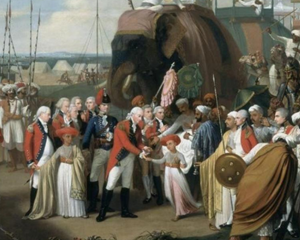With the rise of Napoleon Bonaparte came the excuse to stamp on anyone who might be his Indian ally.
拿破侖·波拿巴的崛起給了英國人借口去打擊一切可能成為印度同盟的人。
And so Wellesley dispatched an overwhelming company army, the vast majority of its manpower Indian sepoys, to Mysore.
于是韋爾斯利派出了一支所向披靡的東印度公司軍隊去攻打邁索爾,而軍隊中大部分士兵都是印度傭兵。
They stormed Tippu's island fortress, Seringapatam, and overwhelmed the Sultan's army.
他們蕩平了蒂普的島嶼要塞,塞陵加巴特木,將蘇丹的軍隊打得潰不成軍。
Tippu was as good as his word and fought to the death, his body discovered where the fighting had been fiercest, shot in the head and stripped of his jewels.
蒂普實現了他的諾言,力戰而亡,他的遺體在戰役進行最激烈之處被發現,他的頭部中彈,身上的財寶也被一搶而光。
Over the next two decades, Wellesley and his successors moved relentlessly across the subcontinent, picking off Indian states one by one.
在接下來的二十年中,韋爾斯利與他的繼任者無情地橫掃了整個次大陸,一個接一個地將印度的省份收入囊中。
In one of Wellesley's letters to his wife, you can hear the authentic voice of the future of British India.
在韋爾斯利寫給其妻子的信中,他發自肺腑地表達了對英屬印度未來的看法。
Farewell, dear soul. I am about to arrange the affairs of a conquered country.
再見了,親愛的。我得去處理那個被征服之地的事務了。
The foundation stones of a true Raj were laid by Richard Wellesley, literally, in 1799, when he decided that British India had to have the kind of building that was fit for an emperor.
理查德·韋爾斯利為大英帝國實現對印度的統治奠定了基礎,具體地說,是在1799年,他決定應該在英屬印度建一座足以彰顯國王氣派的宮殿。
So he built a classical palace in Calcutta, complete with busts of the Roman Caesars and grand colonnades.
于是他在加爾各答建起了一座古典宮殿,殿內布滿凱撒的半身像及壯麗的廊柱。
From it, Richard Wellesley surveyed, with triumphal satisfaction, the stupefying immensity of what had been done.
理查德·韋爾斯利徜徉其間,志得意滿,滿心歡喜,被這華美的建筑迷得神魂顛倒。

It might be pricey. But Wellesley wasn't thinking about double-entry book-keeping. He was too busy measuring his hat size for the victory garland.
花銷也許是大了些。但韋爾斯利的心思全然沒有用在理財上。他正忙于盤點自己的豐功偉績。
As far as he was concerned, what he had wrought, the empire he had carved out, was the ultimate riposte to Napoleon's jibe about the English being a nation of shopkeepers.
拿破侖曾嘲笑英國人只會做小買賣,但他認為,以他此時達到的成就以及他所精心打理的帝國,足以將拿破侖的譏諷反駁得體無完膚。
They were not. They were a nation of empire builders, an empire of arms, of law, of engineering.
英國人并不只會做小買賣。他們能夠建立起一個強大的帝國,一個軍隊嚴明、法律完善、技術高超的帝國。
These men no longer cared about an empire of liberty. That now sounded dangerously French, suspiciously revolutionary.
此時的殖民者不再追求建立自由的帝國了。因為自由帝國聽起來像是危險的法式論調,而且還潛藏這革命的隱患。
Let the Americans play with the tomfoolery of democracy if they chose.
美國人想追求無聊的民主,那就隨便他們吧。
As for the empire of liberty's twin, the empire of trade, surely it was understood now that something grander was in the offing than money-grubbing business.
至于建立自由帝國的孿生兄弟,貿易帝國,這個夢想也不再重要,因為比起盈利的商業貿易,他們還有更偉大的宏圖。
The Almighty had led them, by crooked steps, to be sure, toward their true destiny as the modern Rome, instructor to the benighted, guardians of an empire which would make war to provide peace.
萬能的上帝指引著他們,通過螺旋式上升的階梯,實現建立現代羅馬的目標,成為愚昧之人的導師,為和平而戰的帝國衛士。
And just think, Roman culture might have reached Spain and Jerusalem, but British civilisation would span the world... or so we told ourselves.
但仔細想想,古羅馬的文化最遠只影響到了西班牙和耶路撒冷,英國文化能影響到這個世界嗎,抑或只是自欺欺人。



